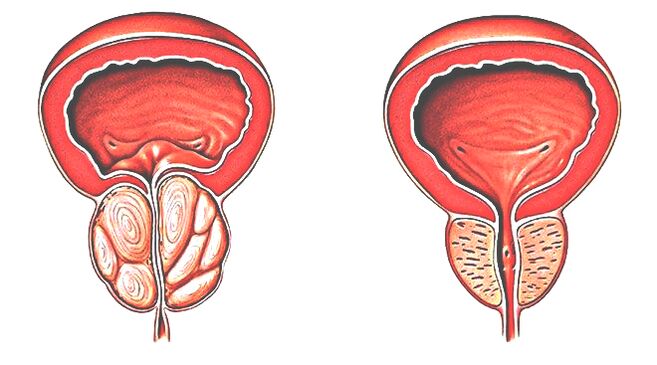The diagnosis of prostatitis often frightens men, but is this disease so dangerous? Prostate inflammation is not a sentence, this problem can be eliminated if treatment is started in time.
Overview of prostatitis
The prostate is an important male organ, any deviation from the norm in its functioning can cause discomfort and negative symptoms. For a number of reasons, this glandular-muscular element fails to fully fulfill its functions:
- control urination;
- secrete a special secret for sperm.
The disease can be bacterial and non-bacterial. The course of the disease is acute and chronic. It is imperative to deal with multiple types of prostatitis to avoid complications.
Symptoms of the disease are mainly associated with pathologies of the urinary system, as well as sexual disorders.
Sexually mature young men (according to statistics, up to 85% of patients aged 25 to 50 years) suffer from symptoms associated with prostatitis. If you don't engage in treatment, complications and failures in reproductive function arise. Bringing prostate health back to normal is every healthy man's job.
By contacting a specialist clinic, you can get competent advice about prostatitis, carry out diagnostic tests, and initiate treatment prescribed by top-level doctors.

Predisposing factors. Causes of Prostatitis
The causes of prostate inflammation are usually related to the activation of bacteria that lead to infection in the genitourinary system, as well as in other organs. Under certain conditions, even E. coli can cause prostatitis in humans.
There are several factors that negatively affect the prostate:
- long stay in the cold;
- ingestion of infections;
- malfunction of the endocrine and circulatory systems;
- lack of regular sex life;
- hormonal disorders;
- hypodynamics;
- stress instability and a weak nervous system;
- smoking, alcohol abuse;
- tight, synthetic underwear;
- violation of basic hygiene rules.
Prostatitis is often a logical consequence of men's inattention to their health and lifestyle. Man simply does not think about the reasons that lead to prostatitis. For example, alcohol and tobacco lovers, often sitting in front of the TV, are at high risk for symptoms of prostatitis. This lifestyle leads to blood stagnation in the pelvic region and the accumulation of infections, which can become a trigger for prostate problems.
Etiology
There are many sources of infections that cause prostatitis. With prostatitis, we are talking about these infectious agents:
- Staphylococcus aureus;
- Escherichia coli;
- klebsiele;
- enterococci;
- seratia;
- Pseudomonas aeruginosa.
Most of them are present in the normal flora of a man's body, but under certain circumstances viruses are activated and pose a health threat. Prostate inflammation occurs when these viruses in the prostate gland behave abnormally.
prostatitis symptoms
A different clinical picture associated with prostatitis manifests depending on the stage and type of disease.
Chronic and acute prostatitis have different symptoms.
A type of prostatitis |
Symptoms |
acute catarrh |
Frequent urination (sometimes painful), pain in the sacrum and perineum |
Acute follicular |
Reinforcing pain intensity, radiating pain sensations to the anus. Problems with urine production (reduced flow, delay, etc. ) Often, inflammation is accompanied by a temperature. |
Acute parenchymal |
Signs of general inflammation of the body: fever (up to 40 °), chills, weakness. Problems with urination and bowel movements. |
Chronicle |
Low fever, scant secretion from the genital organ after evacuation. |




































